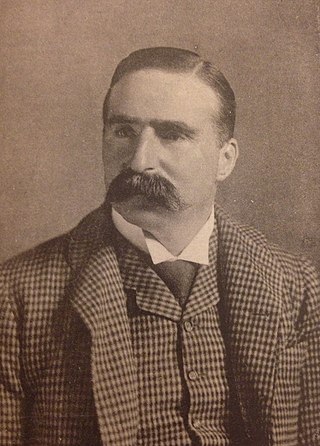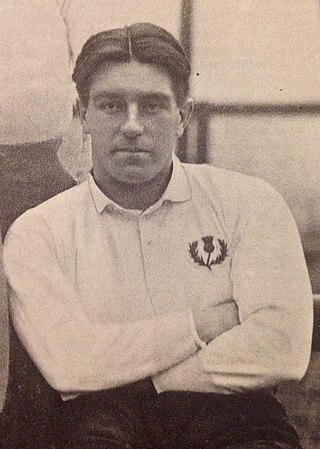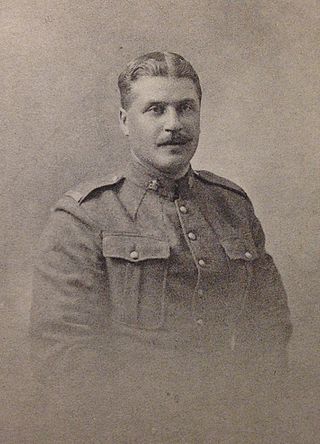
Ronald 'Ronnie' William Poulton was an English rugby union footballer, who captained England. He was killed in the First World War during the Second Battle of Ypres.

Cecil Halliday Abercrombie was a Scottish international rugby union player, first-class cricketer, and an officer in the Royal Navy. Abercrombie passed out from the Britannia Royal Naval College into the Royal Navy in 1902, and shortly thereafter he served abord HMS Hyacinth in the British campaign in Somaliland, being part of the force that captured "Mullah" Hassan's stronghold in 1904. He would later serve aboard HMS Defence at the Battle of Jutland on 31 May 1916, during which he was killed in action.

John Lewis Williams was a Welsh international wing who played club rugby for Cardiff Rugby Football Club. A three times Triple Crown winner, out of seventeen appearances for Wales he was on the losing side only twice.

William Purdon Geen was a rugby union wing and centre, who represented Wales, and played club rugby for Oxford University and Newport and county rugby for Monmouthshire. He was also invited to play for the Barbarians on several occasions. Geen unsuccessfully trialled for England in 1910, but was selected and played for Wales on three occasions in the 1912–1913 season. Injury prevented him from playing more internationals, and his service in the First World War put an end to his career.

Louis Augustus Phillips was a Welsh rugby player, who played half-back for Newport RFC, and won four caps for Wales. He was also a talented amateur golfer.

Admiral Sir George Hamilton D'Oyly Lyon was a distinguished Royal Navy officer as well as an English sportsman who played cricket at first-class level and played rugby union at international level for England, captaining the side in 1909. Beginning his career in the Royal Navy in 1899, Lyon saw action during the First World War and following the conclusion of the war, he moved through the senior ranks of the navy, holding various commands, both at the Admiralty and at sea. He would eventually reach the rank of admiral during the Second World War.

Colonel Richard Davies Garnons Williams was a British Army officer and Welsh rugby union player who represented Wales, Brecon and Newport. He played in the first Wales international rugby union match in 1881.
René Emile Henri Boudreaux was a French rugby union player.

Eric "Puss" MacLeod Milroy was a rugby union player who represented Scotland and Watsonians. He was capped twelve times for Scotland between 1910 and 1914, his first appearance coming as a surprise replacement for the Scottish captain, George Cunningham. He was selected for the 1910 British Isles tour to South Africa after other players were forced to withdraw. Due to illness, he only participated in three matches, and did not take part in any of the tests against South Africa. In 1914, he captained Scotland against Ireland, and against England in the last international match before the outbreak of the First World War.
Jimmy Ross was a Scotland international rugby union player.

Walter Michael "Mike" Dickson was a rugby union player, who represented Scotland, Blackheath and Oxford. He was killed in World War I.
Lt. Albert Luvian Wade was a Scottish rugby union player. He was killed in World War I.

William "Willie" Middleton Wallace was a rugby union player. He played fullback for Cambridge University RFC and was capped for Scotland in 1913–14.

Pte. Andrew Ross was a Scottish rugby union player from Edinburgh. He worked in the Merchant Navy as a marine engineer. He played for Royal High School FP and was capped several times for Scotland between 1905 and 1909.

Pierre Guillemin was a French rugby union player, who represented France, Paris and Racing Club de France (RCF).
John Henry Dods was a Scottish rugby union player. He was capped eight times for Scotland between 1895 and 1897. He also played for Edinburgh Academicals. He was the brother of Francis Dods who was also capped for Scotland.

Arthur "Mud" James Dingle was a rugby union centre and wing, who won three caps for England, and played for County Durham, Hartlepool Rovers and Oxford University.

Francis Nathaniel Tarr was an English international rugby union player. He played centre for the Leicester Tigers and, between 1909 and 1913, won four caps for England, scoring two tries. He also earned three Blues while reading law at Oxford.
Vincent McNamara was a rugby union player who represented Ireland. He died at Suvla Bay, Gallipoli, Ottoman Turkey, during World War I.

Major Robertson "Robbie" Stewart Smyth was an international rugby player, who represented Ireland and Great Britain. Born in County Down, Ireland, he went to Dungannon Royal School, then studied medicine at Trinity College, Dublin, where he obtained his doctorate in 1904. After a year as house surgeon at Sir Patrick Dun's Hospital, he was commissioned into the Royal Army Medical Corps in 1906, and went to India the following year.















